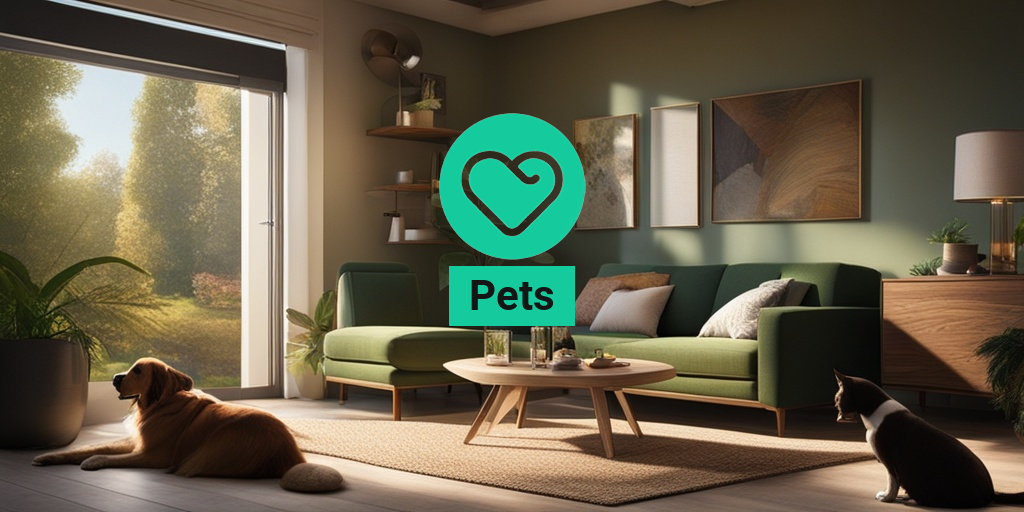What Are the Benefits of Having Pets?
Are you considering bringing a furry friend into your life? Or perhaps you’re already a proud pet parent? Either way, you’re probably aware that having pets can bring immense joy and companionship into your life. But did you know that the benefits of having pets go far beyond just emotional support? From improved physical health to enhanced social connections, having pets can have a significant impact on our overall well-being.
Physical Health Benefits
Having pets can have a profound impact on our physical health. For one, pet owners tend to have lower blood pressure compared to non-pet owners. This is likely due to the calming effect of petting and interacting with our furry friends. Additionally, pets can encourage us to engage in physical activity, such as walking or running with our dogs, which can help reduce the risk of obesity and heart disease.
Social Benefits
Pets can also help us connect with others and build stronger social bonds. Whether it’s striking up a conversation with a fellow dog owner at the park or participating in pet-related social events, having pets can help us meet new people and form meaningful relationships. In fact, a study found that pet owners are more likely to meet new people and form friendships compared to non-pet owners.
Cognitive Benefits
Having pets can even have a positive impact on our cognitive health. For example, children who grow up in households with pets may have improved social skills and emotional intelligence. Additionally, pets can provide a sense of purpose and responsibility, which can be especially beneficial for older adults or those living with disabilities.
How Do Pets Improve Mental Health?
Mental health is a critical aspect of our overall well-being, and pets can play a significant role in supporting our mental health. From reducing stress and anxiety to providing emotional support, pets can be a valuable asset in our mental health journey.
Reducing Stress and Anxiety
Interacting with pets has been shown to reduce cortisol levels, a hormone associated with stress and anxiety. This is likely due to the calming effect of petting and the release of oxytocin, often referred to as the “love hormone.” Whether it’s playing with a cat or simply cuddling with a dog, pets can help us relax and unwind.
Providing Emotional Support
Pets can provide emotional support and comfort, which can be especially beneficial for those living with mental health conditions such as depression or PTSD. In fact, therapy animals are often used in mental health treatment plans to provide emotional support and comfort to patients.
At Yesil Health AI (yesilhealth.com), we understand the importance of mental health and the role that pets can play in supporting our well-being. That’s why we provide evidence-based health answers and resources to help you make informed decisions about your health.
In conclusion, having pets can bring a multitude of benefits into our lives, from improved physical and mental health to enhanced social connections and cognitive function. So, if you’re considering bringing a furry friend into your life, rest assured that it’s a decision that can have a lasting impact on your overall well-being 🐾💕.

Can Pets Help Lower Blood Pressure?
High blood pressure is a silent killer that affects millions of people worldwide. While medication and lifestyle changes are often prescribed to manage this condition, there’s another unlikely hero that can help: pets! 🐾
The Science Behind Pet-Owner Bonding
Studies have shown that simply petting a dog or cat can lower blood pressure and heart rate. This is due to the release of oxytocin, often referred to as the “love hormone,” which promotes feelings of relaxation and bonding. In fact, a study published in the Journal of the American Osteopathic Association found that pet owners experienced a significant decrease in blood pressure after just 10 minutes of petting their furry friends! 🐶
The Power of Social Support
Pets provide companionship, which is essential for our emotional and mental well-being. Social isolation, on the other hand, can exacerbate high blood pressure. By having a pet, individuals can experience a sense of connection and belonging, reducing feelings of loneliness and anxiety. This, in turn, can help lower blood pressure and promote overall cardiovascular health. According to the American Heart Association, strong social connections can lower blood pressure and reduce the risk of heart disease.
Reducing Stress with Pets
Stress is a significant contributor to high blood pressure. Pets have a unique ability to calm us down and reduce stress levels. Whether it’s playing with a pet, watching them sleep, or simply cuddling, the emotional support they provide can be incredibly therapeutic. By reducing stress, pets can indirectly help lower blood pressure and promote a healthier lifestyle. 🙏
The Role of Pets in Reducing Stress and Anxiety
Stress and anxiety are common afflictions that can have a significant impact on our mental and physical health. While there are many ways to manage stress, one often overlooked solution is the presence of pets in our lives. 🐱
Pets as Emotional Support
Pets have an uncanny ability to sense our emotions and respond accordingly. They can provide comfort, reassurance, and unconditional love, which can be incredibly calming in times of stress and anxiety. In fact, many mental health professionals incorporate animal-assisted therapy into their treatment plans, recognizing the profound impact pets can have on our emotional well-being. 🐾
The Calming Effects of Petting
Petting a pet can be a calming and soothing experience, reducing feelings of anxiety and stress. The gentle stroking motion can slow down our heart rate, lower our blood pressure, and promote relaxation. This is especially true for individuals who experience anxiety attacks or panic disorders. A study published in the Journal of Clinical Psychology found that petting a dog can reduce symptoms of anxiety and depression in individuals with mental health disorders.
Pets and Social Connection
Pets can help us connect with others, whether it’s through dog parks, pet stores, or online communities. This social connection can be a powerful tool in reducing stress and anxiety, as we feel supported and understood by others who share similar experiences. By providing a sense of belonging, pets can help us build stronger social connections and reduce feelings of loneliness. 🐾
In conclusion, pets play a vital role in promoting our physical and mental health. By reducing stress and anxiety, and even helping to lower blood pressure, pets are more than just companions – they’re lifesavers! 🙏 So, if you’re considering getting a pet or already have one, remember to cherish the bond you share and reap the benefits of pet ownership. 🐾❤️

How Do Pets Affect Children’s Health?
As a parent, you want the best for your child, and that includes providing a happy and healthy environment. One way to do this is by introducing pets into your family. But have you ever wondered how pets affect children’s health? The answer might surprise you!
The Benefits of Pet Ownership for Children
Research has shown that growing up with pets can have a significant impact on a child’s physical and mental health. Here are some of the benefits:
- Improved Social Skills: Interacting with pets can help children develop essential social skills like empathy, communication, and responsibility.
- Reduced Stress and Anxiety: Playing with pets or simply petting them can reduce stress and anxiety levels in children, promoting a sense of calm and relaxation.
- Boosted Immune System: Exposure to pets in early childhood can strengthen a child’s immune system, reducing the risk of allergies and infections.
- Increased Physical Activity: Caring for pets, such as walking dogs or playing with cats, can encourage children to engage in physical activity, promoting a healthy lifestyle.
The Importance of Pet Hygiene and Safety
While pets can bring numerous benefits to children’s health, it’s essential to maintain good pet hygiene and safety practices to avoid potential health risks. Here are some tips:
- Wash Those Hands: Encourage children to wash their hands regularly, especially after touching pets or their waste.
- Vaccinate and Microchip: Ensure pets are up-to-date on vaccinations and microchipped to prevent the spread of diseases.
- Keep Pets Clean: Regularly bathe and groom pets to prevent the buildup of dirt and bacteria.
- Supervise Interactions: Always supervise interactions between pets and children to prevent accidents or injuries.
The Risks of Pet Ownership: Allergies and Infections
While pets can bring joy and companionship to families, they can also pose health risks, especially for children. Two common concerns are allergies and infections.
Pet Allergies in Children
Pet allergies occur when a child’s immune system overreacts to proteins in pet dander, saliva, or urine. Common symptoms include:
- Sneezing and Congestion: Allergic reactions can cause sneezing, congestion, and runny noses.
- Itchy Eyes and Skin: Allergens can trigger itchy eyes, skin rashes, and hives.
- Asthma Attacks: In severe cases, pet allergies can trigger asthma attacks in children.
Pet-Related Infections in Children
Pets can carry bacteria, viruses, and parasites that can cause infections in children. Some common infections include:
- Ringworm: A fungal infection that can cause skin rashes and hair loss.
- Salmonella: A bacterial infection that can cause diarrhea, fever, and abdominal cramps.
- Hookworms: Parasites that can cause skin rashes, diarrhea, and respiratory problems.
By understanding the risks and taking necessary precautions, you can ensure a happy and healthy relationship between your child and their furry friends 🐾💕.

How to Keep Your Pet Healthy and Happy
As a pet owner, there’s nothing more important than ensuring your furry friend is healthy and happy. A happy pet is a reflection of a happy home, and with a few simple tips, you can keep your pet thriving. 🐾
Provide a Balanced Diet
A well-balanced diet is essential for your pet’s overall health. Feed high-quality pet food that meets your pet’s nutritional needs, and avoid overfeeding or underfeeding. Consult with your veterinarian to determine the best diet for your pet.
Stay Hydrated
Ensure your pet always has access to fresh, clean water. Change the water frequently to prevent bacterial growth, and consider adding a water fountain to encourage drinking.
Exercise and Playtime
Regular exercise and playtime are crucial for your pet’s physical and mental health. Take your dog for daily walks, play fetch, or engage in interactive toys with your cat. This will help reduce stress, improve mood, and maintain a healthy weight.
Regular Grooming
Regular grooming is essential for your pet’s hygiene and overall health. Brush your pet’s coat regularly to prevent matting and tangling, and trim their nails to prevent overgrowth.
Provide Mental Stimulation
Mental stimulation is vital for your pet’s cognitive health. Provide puzzle toys, hide-and-seek games, or scent work to challenge your pet’s mind and prevent boredom.
The Importance of Vaccinating Your Pet
Vaccinating your pet is one of the most critical steps in keeping them healthy and happy. Vaccinations protect your pet from contracting serious diseases, some of which can be life-threatening. 🐕
Why Vaccinations Are Necessary
Vaccinations help prevent the spread of diseases, protecting not only your pet but also other animals in your community. Some diseases, such as rabies, can even be transmitted to humans.
Core Vaccinations
Core vaccinations are essential for all pets and include:
- Rabies
- Distemper
- Hepatitis
- Parvovirus
Non-Core Vaccinations
Non-core vaccinations are recommended based on your pet’s lifestyle, age, and health status. These may include vaccinations for:
- Bordetella (kennel cough)
- Leptospirosis
- Lyme disease
Consult with Your Veterinarian
Consult with your veterinarian to determine the best vaccination schedule for your pet. They will consider factors such as your pet’s age, health status, and lifestyle to create a personalized vaccination plan.
By following these simple tips, you can keep your pet healthy and happy. Remember, a healthy pet is a happy pet, and with regular vaccinations and proper care, you can ensure your furry friend lives a long, happy life. 🐾💕

Frequently Asked Questions about Pets
As a responsible pet owner, it’s natural to have questions about your furry friends. Here are some frequently asked questions about pets that you might find helpful:
General Pet Care
Got questions about taking care of your pets? We’ve got you covered!
Q: What are the essential supplies I need for my pet?
A: The essential supplies you need for your pet depend on the type of pet you have. However, some common supplies include food, water, shelter, bedding, toys, and grooming tools.
Q: How often should I take my pet to the vet?
A: The frequency of vet visits depends on the age and health of your pet. Generally, puppies and kittens need to visit the vet every 3-4 months, while adult pets need to visit at least once a year.
Pet Health and Wellness
Concerned about your pet’s health? Here are some answers to your questions:
Q: What are the common signs of illness in pets?
A: Common signs of illness in pets include vomiting, diarrhea, lethargy, loss of appetite, and changes in behavior or appetite.
Q: How can I keep my pet’s teeth clean?
A: You can keep your pet’s teeth clean by brushing them regularly with a pet-specific toothbrush and toothpaste, providing dental chews and toys, and scheduling regular dental check-ups with your vet.
Pet Behavior and Training
Got questions about your pet’s behavior or training? We’re here to help!
Q: How can I housebreak my pet?
A: Housebreaking your pet requires patience, consistency, and positive reinforcement. Establish a routine, reward good behavior, and be prepared for accidents.
Q: Why does my pet have separation anxiety?
A: Separation anxiety in pets can be caused by a variety of factors, including changes in your work schedule, moving to a new home, or lack of socialization. Consult with a vet or a pet behaviorist to develop a plan to help your pet feel more comfortable when you’re away.
Pet-Friendly Living
Thinking of moving to a new home or traveling with your pet? Here are some answers to your questions:
Q: Are there any pet-friendly hotels or vacation rentals?
A: Yes, there are many pet-friendly hotels and vacation rentals available. Be sure to research and book in advance to ensure that your pet is welcome.
Q: How can I find pet-friendly apartments or homes?
A: You can find pet-friendly apartments or homes by searching online, contacting local real estate agents, or visiting pet-friendly housing websites.
We hope these FAQs have been helpful in answering some of your questions about pets! 🐾💕




